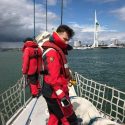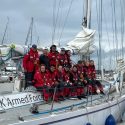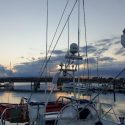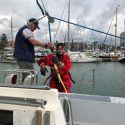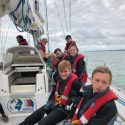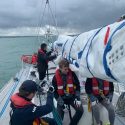After a long break from adventure training, the summer of 2021 saw a crew of 11 Officer Cadets from the University of London Officers’ Training Corps prepare for a voyage from Portsmouth to the Isles of Scilly. For the vast majority it was their first experience sailing and it should have been an opportunity for novices to attain their RYA Competent Crew qualification. The intervention of Covid brought the exercise to premature end however; but what sailing that was undertaken proven enough to whet the appetites of the OCdts for future opportunities.
Training Phase
Upon arriving at the boat, HMSTV Adventure, the crew wasted no time in getting to know the 72 foot yacht. Given that most of the crew had no or very little sailing experience, a relatively rapid increase in confidence and skills was to be required before there was any prospect of reaching the open sea. Once duties had been assigned and the boat cleaned (as it had not be used for almost two years) the OCdts moved on to practical skills. Having learnt about the vessel’s lifesaving equipment and engine in a classroom environment the crew moved on to the eternal challenge of new sailors: knot-tying. Having generally mastered knots such as the reef and bowline, drills such as rigging the ship for slips and coming alongside a pontoon were also practiced. There was also time for a couple of man-over-board drills with one of the emergency swimmers.
Sailing Phase
Having learnt and practiced their core skills, the Adventure spent the Saturday afternoon and all of Sunday in the Solent. The crew were joined on the Sunday by their Commanding Officer, Lieutenant Colonel Iain Wallace. Out of harbour the real learning began as knots were put into practice and the watches began to improve the efficiency of their drills. Raising the head and main sail were key lessons, as well putting in a reef to the main sail. Particular attention was paid to man-over-board drills and six were carried out on the Sunday, two for each emergency swimmer. Having come to grips with manoeuvring the dummy into the rescue straps and making them secure, the drill became efficient – taking only a couple of minutes between lowering the swimmer and retrieving the casualty. As the crew returned to Portsmouth on Sunday they were tired but happy and could be very satisfied with the progressed they had made compared to their novice standing the previous morning.
A Covid contact caused the exercise to be ended before any more sailing could take place, causing immense disappointment to crew and staff alike. However, the basic skills covered over the weekend they did have has furnished the OCdts with the ability to undergo further sailing training as well as encouraging them to seek new AT opportunities at sea with the British Army. Ulysses Trust are thanked for their support to the exercise which has generated interest in future sailing expeds.
Novice Reflective Statement – OCdt Sam Fowler
Having never sailed beyond one day in a plastic boat with PGL, HMSTV Adventure proved to be quite the step-up. At 72-feet long she required a large crew, most of whom were fellow novices which went some way to removing any concerns I may have had. The crew was made up of 11 OCdts of A and B Companies and 4 members of staff. I was particularly drawn by the ability to gain my Competent Crew qualification over the course of the expedition, unfortunately this was not to be.
The expedition began well if stressfully. Having never driven the unit combivan on the road outside of camp I was one of two designated OCdt drivers for the journey from Handel Street to Gosport. In the end I was happy to have had the opportunity to have some practice behind the wheel.
Once introduced to the boat on that first evening the reality of what the expedition would be like began to dawn on me. At 6’ 2 I was the tallest member of the crew and found the amount of space available below deck to be restrictive to say the least. My thoughts were not improved by the memory of my being very sea sick on the few journeys I’d taken at sea as a child many years earlier.
I was assigned the role of Emergency Swimmer due to my height, a role which would prove both exciting and moist. I was also made Media Officer, understandable given that I study History, and the ship’s electrician, which is less understandable given that I study History. Both of these roles proved to be less daunting than they had first seemed. A later development was my being assigned the job of climbing part way up the mast in order to allow the main sail to be raised and then to be secure to keep it from rising when we wanted it down. Again I was assisted in carrying out this duty in no small part by my height and I only actually had to climb around 2 metres into the air.
The Saturday brought training on the bowline knot, which I found difficult to master until the following day. After brief lessons on lifesaving equipment and the engine we were then instructed on how to prepare the ship to leave the pontoon and to come back alongside, a drill that was relatively simple and allowed everyone to make themselves useful. Due to my poor knot-tying capabilities I made myself in charge of the roving fender (or ‘the testicle’ as it was affectionately known) to ensure the boat was protected from damage at the point it first made contact with the pontoon. This job also entailed me ensuring no one was knocked unconscious by our dinghy as it briefly dangled over the pontoon when we reversed into our mooring point. A fun half-day’s sailing was had in the Solent and crew morale proved to be exceptionally high.
On Sunday we were joined by Lt Col Wallace for a full day’s sailing in the Solent. Most notably for me this involved my being used as the Emergency Swimmer for three man-over-board drills. The task of being dangled over the side of the boat and dunked into the sea in order to collect a casualty may not seem like a task you’d want but I enjoyed it. It took the first attempt to come to terms with the helicopter hoist straps and my subsequent rescue attempts on our 40kg dummy guest ‘Wilson’ (named in honour of the volleyball in Castaway) were increasingly rapid. Unfortunately and very unjustly for the man who had to wear the emergency swimmer suit after me, I undid one of its seals trying to get excess air out once I was in the water, and it subsequently filled up a bit. Our return to Portsmouth was without incident and the CO appeared to enjoy his time on board. Crew morale remained high, even if they were so tired that they appeared immune from appreciating my attempts at comedy.
Unfortunately, our time on Adventure was cut short by a positive covid case in the flat of one of the crew. Covid restrictions ended the exercise after a couple of days in isolation in Fort Blockhouse and Handel Street.
Despite the highly anticlimactic ending for our trip I thoroughly enjoyed what little sailing I had. As a novice I felt some progression over the few days and was able to effectively contribute to the crew’s successful drills. I have gained a good grounding in core sailing skills and am very keen to complete my Comp Crew training at the earliest possible and to just sail again with the ULOTC. I look forward to future sailing opportunities, which is saying something as I had not especially considered this AT activity before joining the unit just last year.

